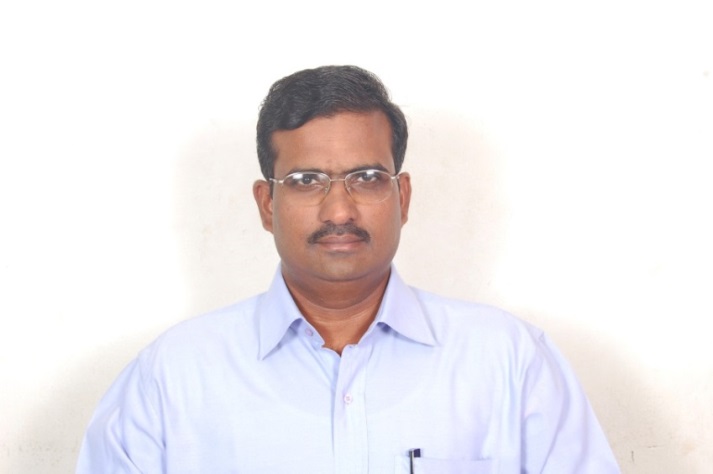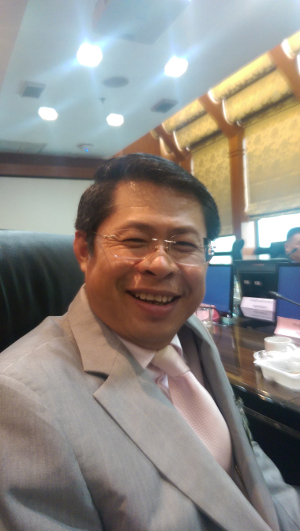MIWAI'2014
The 8th Multi-Disciplinary International Workshop on Artificial Intelligence
Publication
 Proceedings of MIWAI 2014 will be published in Springer LNAI series.
Proceedings of MIWAI 2014 will be published in Springer LNAI series.
Flags Counter started on April 25, 2014
Tutorials
Dr. P. Krishna Reddy (Tutorial Speaker)
 |
Dr P.Krishna Reddy Program Director, ITRA: Agriculture & Food, DietY, Govt. of India and Professor International Institute of Information Technology Hyderabad (IIIT-H) Gachibowli, Hyderabad, Telangana State 500032 India Phone: 91-40-66531000 Ext: 1322; Fax: 91-40-66531413 E-mail: pkreddy@iiit.ac.in http://www.iiit.ac.in/~pkreddy/ |
Brief Biography: P. Krishna Reddy is a professor at Center for Data Engineering, International Institute of Information Technology Hyderabad (IIIT-H), Hyderabad, India, since 2007. Since November 2013, he is also serving as a Program Director, ITRA-Agriculture & Food, Information Technology Research Academy (ITRA), Division of Media Lab Asia, Ministry of Communications & IT, Government of India. He has worked as an associate professor at the same university from 2002 to 2006. From 1997 to 2002, he was a research associate at the Center for Conceptual Information Processing Research, Institute of Industrial Science, University of Tokyo. From 1994 to 1996, he worked as a faculty member at the Division of Computer Engineering, Netaji Subhas Institute of Technology, Delhi. During the summer of 2003, he was a visiting researcher at Institute for Software Research International, School of Computer Science, Carnegie Mellon University, Pittsburg, USA. He has received both MTech and PhD degrees in computer science from Jawaharlal Nehru University, New Delhi in 1991 and 1994, respectively. His research interests include data mining, web mining, data management, transaction models, distributed computing, and ICTs for agriculture. He has published about 100 refereed research papers which include 14 journal papers and three book chapters. He has delivered several invited/panel talks at the reputed conferences and workshops in India and abroad. He was a proceedings chair of COMAD 2008 and a workshop chair of KDRS 2010. He has organized the 14th Pacific-Asia Conference on Knowledge Discovery and Data Mining (PAKDD2010) in Hyderabad, India. He has got several awards and recognitions. He is a steering committee member of pacific-asia data mining conference series since 2010. Since 2004, he has been investigating the building of eSagu system, which is an IT-based Personalized Agro-Advisory system, to provide scientific agricultural information to farming community. The eSagu system has got several recognitions including CSI-Nihilent e-Governance Project Award in 2006 and Manthan Award in 2008. In addition to eSagu system, since 2010, he is investigating the building of eAgromet system which is an ICT-based agro-meteorological advisory system to provide risk mitigation information to farmers with the funding support from Indian Meteorological Department, Ministry of Earth Sciences.
Title: Building Information/Knowledge Based Decision Support Systems for Better Agriculture.
Abstract: The eSagu system is a personalized agro-advisory system. In eSagu, the expert advice is generated by agricultural experts based on the latest information about the crop situation received in the form of both digital photographs and corresponding feedback text. Several impact studies reported that the farmers have realized considerable monetary benefits by reducing the quantity of fertilizer application, pesticide sprays, besides getting the additional yield. By considering village as a unit, we have developed a scalable and cost-effective system which can deliver location-specific agricultural advices in a regular manner throughout the year. The technology can bring next agriculture revolution as it aims to help every farmer of India, including poor and marginal farmers.
The eAgromet system is an IT-based agro-meteorological advisory system. The India Meteorological Department is disseminating agromet advisory bulletins, which contain possible weather related risk mitigation measures, to farmers and other stakeholders through about 130 Agro Meteorological Field Units (AMFUs). We are building an eAgromet system to improve the efficiency of preparing agromet advisory bulletins. The system is built and it is operational.
The notion of virtual crop labs is conceptualized to improve practical field skills of agriculture students/scientists. It can be noted that the crop husbandry problems vary from year to year and place to place due to temporal and spatial variability of the region/country. In spite of significant efforts, there is a feeling that the level of practical skills exposed to the students is not up to the desired level. The practical knowledge of students could be improved, if we systematically expose them to virtual crop lab content with well organized, indexed and summarized digital data (text, digital photos and video) of diverse farm situations along with course teaching.
With the preceding background, I am planning to offer a tutorial to excite the participants to conceive data/knowledge based decision support systems for better agriculture. The outline of the tutorial is as follows: Introduction and background, Problems in agriculture, opportunities provided by the advances in data and knowledge sciences, Case studies of eSagu, eAgromet and Virtual Crop Labs, Data and knowledge based systems in India and abroad, Opportunities to build data and knowledge based decision support systems in agriculture.
Dr. Chattrakul Sombattheera (Tutorial Speaker)
 |
Dr. Chattrakul Sombattheera Faculty of Informatics Mahasarakham University Khamreang Sub-District Kantarawichai District Maha Sarakham 44150 Thailand Email: chattrakul.s@msu.ac.th |
Brief Biography: Dr. Chattrakul Sombattheera received his Bachelor of Computer Science from Ramkhamhaeng University, Thailand in 1992. He spent three years working for Control Data Thailand maintaining the AFFIS (Automatic Face and Fingerprint Identification System) project of the Ministry of Interior of Thailand. In 1995, he began his long journey in Australia. He obtained a Graduate Diploma in Computer Science from the University of Western Australia in 1996 and Master of Information Technology in 1998 from The University of Sydney. After that, he worked as a business developer for a couple of companies in Sydney, including Alstom IT. In 2001, the wind of change blew him back to Thailand where became a lecturer at Mahasarakham University—a place near his hometown—and holds his affiliation there ever since. In 2003, he headed back to Australia for his PhD at the University of Wollongong in NSW. His thesis focuses on optimal coalition structure, an important area of multiagent systems, and its application to real world problems. Since his return to Mahasarakham in 2008, he has done both administrative and academic works. In administration, he was appointed as Assistant Dean and Associate Dean for research and international relation. In academic work, he has founded the Multiagent and Intelligent Systems Laboratory (MISL). He and his group have won many research grants from both government agencies and companies in multiple industries. The most recent projects are in defence industry where multiagent systems are very important and useful.
Title: Introduction to Coalition Formation
Abstract: Coalition formation is an important area of research in multiagent systems because it can efficiently handle complexity of problems in the real world. It addresses underpinning theories, known as solution concepts, which bring about stable states to the system. While the complexity of the real world problem has been consistently increasing, classical centralized techniques fall short of ability to handle them. Coalition formation offers distributed approaches, which leverage individual abilities of agents in the system and combine them to unleash the unprecedented power to help solve the complex problems efficiently. In this tutorial, I will cover three classical solution concepts in coalition formation, namely, kernel, the core, and Shapley value. Then, I will show, in my research, how these solution concepts can be applied to handle complexity in real world problems.







 1
1 2
2 3
3 4
4 5
5 6
6 7
7